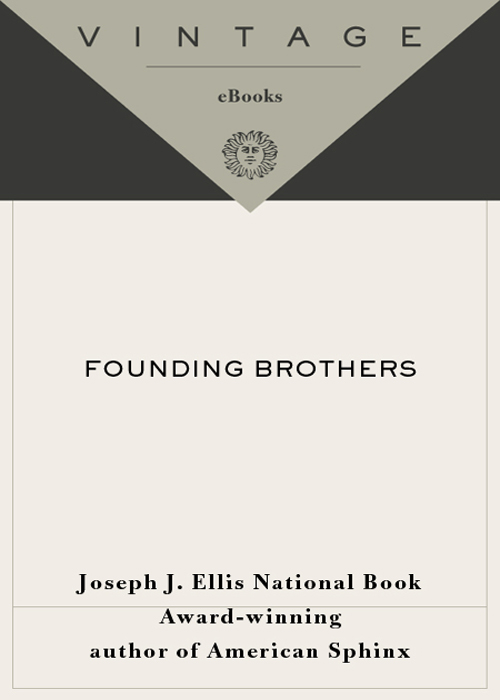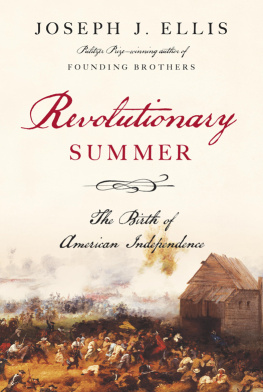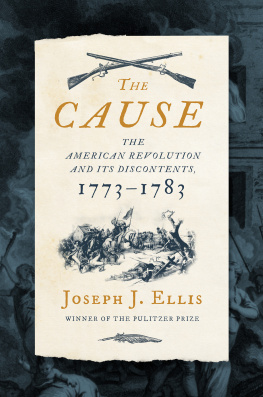Joseph J. Ellis - Founding Brothers: The Revolutionary Generation
Here you can read online Joseph J. Ellis - Founding Brothers: The Revolutionary Generation full text of the book (entire story) in english for free. Download pdf and epub, get meaning, cover and reviews about this ebook. year: 2002, publisher: Vintage, genre: Detective and thriller. Description of the work, (preface) as well as reviews are available. Best literature library LitArk.com created for fans of good reading and offers a wide selection of genres:
Romance novel
Science fiction
Adventure
Detective
Science
History
Home and family
Prose
Art
Politics
Computer
Non-fiction
Religion
Business
Children
Humor
Choose a favorite category and find really read worthwhile books. Enjoy immersion in the world of imagination, feel the emotions of the characters or learn something new for yourself, make an fascinating discovery.

- Book:Founding Brothers: The Revolutionary Generation
- Author:
- Publisher:Vintage
- Genre:
- Year:2002
- Rating:5 / 5
- Favourites:Add to favourites
- Your mark:
- 100
- 1
- 2
- 3
- 4
- 5
Founding Brothers: The Revolutionary Generation: summary, description and annotation
We offer to read an annotation, description, summary or preface (depends on what the author of the book "Founding Brothers: The Revolutionary Generation" wrote himself). If you haven't found the necessary information about the book — write in the comments, we will try to find it.
Founding Brothers: The Revolutionary Generation — read online for free the complete book (whole text) full work
Below is the text of the book, divided by pages. System saving the place of the last page read, allows you to conveniently read the book "Founding Brothers: The Revolutionary Generation" online for free, without having to search again every time where you left off. Put a bookmark, and you can go to the page where you finished reading at any time.
Font size:
Interval:
Bookmark:

Founding Brothers
THE REVOLUTIONARY GENERATION
JOSEPH J. ELLIS

Vintage Books
A Division of Random House, Inc.
New York
ACCLAIM FOR JOSEPHJ. ELLISS
Founding Brothers
Lively and illuminating leaves the reader with avisceral sense of a formative era in American life. A shrewd,insightful book.
The New YorkTimes
Masterful. Fascinating. Ellis isan elegant stylist. [He] captures the passion the founders brought tothe revolutionary project. [A] very fine book.
Chicago Tribune
Splendid. Revealing. An extraordinary book. Itsinsightful conclusions rest on extensive research, and its authorswriting is vigorous and lucid.
St.Louis Post-Dispatch
Ellis has shown here theconsiderable power of knowledgehis knowledge. [He] unpacks thereal issues for his readers, revealing the driving assumptions and rivetingfears that animated Americans first encounter with the organizedideologies and interests we call parties.
The Washington Post Book World
Lucid. Bustling stories that describ[e] how ourearly republic looked and felt. FoundingBrothers takes on timeworn topics and leavens them with tellingdetails. Ellis has such command of the subject matter that it feelsfresh, particularly as he segues from psychological to political, even tophysical analysis. Elliss storytelling helps us more fully hearthe Brothers voices.
BusinessWeek
Magnificent. Ellis eloquently conveys theinterconnected personal relationships and overriding issues that set thenations course. Carefully researched, beautifullywritten.
BookPage
Succinct and telling portraits. Even those familiar withthe Revolutionary generation will find much in its pagesto captivate and enlarge their understanding of our nations fledglingyears.
The New York Times BookReview
Subtle. Readers who fancy detectivestories will enjoy following Ellis down various conjecturaltrails. And those who appreciate the untangling of thought processeswill enjoy seeing Ellis tease out the deeper meanings behind the words of hisprotagonists. Splendid.
TheNews & Observer (Raleigh, North Carolina)
Learned,exceedingly well-written, and perceptive. Ellis is at his bestconveying not only the historical perspective of these patrons of the AmericanRevolution, but also the personal hurts, joys, capitulations, regrets,recantations of old wrongs, familial tragedies, and ultimately the finaljudgments they make about each other and the Revolution. Along the way, Ellismanages something rare in a history, rare in any writing: he captures theineffable qualities that inhabit friendship.
The Oregonian
Ellis has long been alamp unto the feet of those who study the Revolutionary and early nationalperiods. His judgments are balanced, and his prose is effortless, everypage a reward to read.
HoustonChronicle
Splendid. A remarkable read.Elliss touching portraits are wonderful. Ellis has ascholars head but a writers heart. [He] tells the humandetails of these superhumans in short vignettes that work as individual stories[and] has a gift for selecting the best detail to illustrate an important traitor event.
The AtlantaJournal-Constitution

Contents
For Ellen

ACKNOWLEDGMENTS
THEIDEA that gives this book its shape first came to mind while rereadinga mischievous little classic by Lytton Strachey entitled EminentVictorians. My problem, at least as I understood it at that early stage,was a matter of scope and scale. I wanted to write a modest-sized account of amassive historical subject, wished to recover a seminal moment in Americanhistory without tripping over the dead bodies of my many scholarlypredecessors, hoped to render human and accessible that generation of politicalleaders customarily deified and capitalized as Founding Fathers.
Eminent Victorians made Strachey famous for the sophisticationof his prejudiceshis title was deeply ironicbut I want to thankhim for giving me the courage of mine. His animating idea, a combination ofstealth and selectivity, was that less could be more. It is not by thedirect method of scrupulous narration, Strachey wrote,
that the explorer of the past can hope to depict a singular epoch. Ifhe is wise, he will adopt a subtler strategy. He will attack his subject inunexpected places; he will fall upon the flank and rear; he will shoot a suddenrevealing searchlight into obscure recesses, hitherto undivined. He will rowout over the great ocean of material, and lower down into it, here and there, alittle bucket, which will bring up to the light of day some characteristicspecimen, from those far depths, to be examined with a carefulcuriosity.
With this model in mind, I rowed out over the greatocean of material generated in the founding era of American nationhood, loweredmy little bucket as far down as my rope could reach, then made sense out of thecharacteristic specimens I hoisted up with as much storytelling skill as myimagination allowed.
The characteristic specimens were drawn fromthat rich depository of published letters and documents generated by scholarlyeditors over the past half-century. Like everyone else who has tried to makesense out of Americas revolutionary generation, I am deeply indebted tothe modern editions of their papers. The endnotes reflect my dependence onspecific collections, but let me record here a more comprehensive appreciationfor the larger project of preservation and publication that, thanks to federaland private funding, permit us to recover the story of Americas foundingin all its messy grandeur.
As soon as I had drafted a chapter, Isent it out for criticism to fellow scholars with specialized knowledge aboutthe issues raised in that particular story. The following colleagues saved mefrom countless blunders: Richard Brookhiser, Andrew Burstein, Robert Dalzell,David Brion Davis, Joanne Freeman, Donald Higginbotham, Pauline Maier, LouisMazur, Philip Morgan, Peter Onuf, and Gordon Wood. As anyone familiar with thehistorical profession can attest, I had the benefit of criticism from some ofthe best minds in the business. What I chose to do with it, of course, remainsmy responsibility.
Three friends and mentors read the entiremanuscript and offered substantive or stylistic suggestions on the book as awhole: Eric McKitrick, who knows more about the political culture of the earlyrepublic than anyone else; Edmund Morgan, who first taught me to do Americanhistory and still does it better than anyone else; Stephen Smith, whose currentposition as editor of U.S. News and World Report somewhat conceals hiscalling as the sharpest pencil inside or outside the beltway.
Theentire manuscript was handwritten in ink, not with a quill but with amedium-point rollerball pen. The art of deciphering my scrawl and transcribingthe words onto a disk fell first to Helen Canney, who worked with me on threeprevious books but was taken away at an early stage of this one. Holly Sharacpicked up where she left off without missing a beat.
My agent,Gerald McCauley, handled the contractual intricacies of publication and thenbecame a one-man cheering section on the sidelines. Ashbel Green, my editor atKnopf, lived up to his reputation as the salt of the earth. His able assistant,Asya Muchnick, supervised the editing process with a hard eye and a softheart.
Next pageFont size:
Interval:
Bookmark:
Similar books «Founding Brothers: The Revolutionary Generation»
Look at similar books to Founding Brothers: The Revolutionary Generation. We have selected literature similar in name and meaning in the hope of providing readers with more options to find new, interesting, not yet read works.
Discussion, reviews of the book Founding Brothers: The Revolutionary Generation and just readers' own opinions. Leave your comments, write what you think about the work, its meaning or the main characters. Specify what exactly you liked and what you didn't like, and why you think so.



